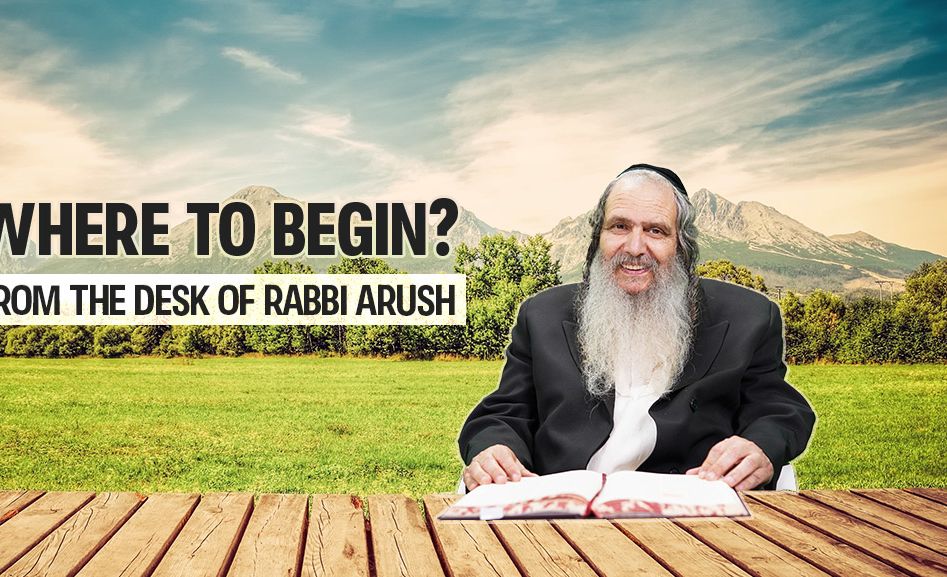
The Broken Heart
A person with a broken heart sees himself as small and ineffective. Really, the opposite is true. A person in trouble or with a broken heart is humble...

Translated by Rabbi Lazer Brody
In Forest Fields, Part 29
Rebbe Nachman told his followers in Discourse 70:
“How do we allow Hashem to ponder and implement harsh decrees in the world? We must call Hashem away from all His other tasks. We must distract Him from sending harsh decrees to the world, Heaven forbid. We must tell Him to put everything else aside and listen to us, for we want to ask Him to draw us close. For when a person wishes to speak to Hashem, He casts aside everything else and all the harsh decrees that He wants to decree, and turns His attention to the person that wants to speak to Him and ask for assistance in getting close to Him.”
When we combine Rebbe Nachman’s teaching with the aforementioned Zohar, we can conclude that the poor man’s prayer protects the entire world. Here’s how: when the poor man appeals to Hashem, Hashem sends everyone away including the Heavenly Tribunal and the administering archangels. With no one else around but the poor man’s prayer, there cannot be any accusation, stern judgments or harsh decrees.
We also learn that the prayers of our great tzaddikim – as humble and as pious as they might be – still lack the cogency of the poor and needy person. Even though Moses and David acted like poor people, they were spiritual multimillionaires. So, even if we’re not collecting welfare, thank G-d, we can still appeal to Hashem as poor people, because on a spiritual level, our generation is starving. So in effect, when each one of us stands in prayer before Hashem, he or she protects the entire world.
An opportunity to get closer
Our sages said that if there’s no flour, then there’s no Torah. The deeper inner dimension of this ever-so-wise saying is that a person cannot serve Hashem if he lacks such basics as food, clothing, and shelter. Inasmuch as our material possessions enable us to serve Hashem, then our material requests actually become spiritual requests.
Going a step further, there’s a lofty level in spirituality whereby a person prays exclusively for his spiritual needs. Once he succeeds in fulfilling his spiritual aspirations, then his material needs are met automatically, since once again, “if there’s no flour, then there’s no Torah.” Yet in all fairness and practicality, a person is hard-pressed to seek spirituality when the landlord is threatening to evict him from his apartment or when creditors are banging on his front door all day long. A person in dire straits must appeal to Hashem for immediate help. Hashem puts people in high-pressure situations in order that they’ll have to turn to Him.
Stress situations are really gifts from Hashem. Hashem puts people in such situations so that they can learn the power of prayer. When a person sees that no one can help him, he therefore turns to Hashem with all his broken heart in prayer. Hashem will oftentimes save that person from all calamity to reinforce that person’s belief in Hashem and in the power of prayer.
The more we pray, the more we see the fantastic results of prayer, and the more we gain incentive to increase our prayers, both in quality and in quantity.
Hashem, the Master Creator, wants the very best for each of His creations. Ask yourself a question: Is it logical that Hashem would deliberately create a creation with deficiencies? Think about the things you do and create – you try your best to do a perfect and unblemished job. If we mortal and limited people strive for perfection in whatever we do, then it’s obvious that Hashem certainly desires that His creations attain perfection as well. As such, when we pray to Hashem to help us correct our misdeeds, character blemishes, and whatever else in our spiritual and physical lives that needs correcting, we are actually doing Hashem’s will. Such prayer that is in perfect congruence with Hashem’s will is readily accepted.
I cried out from the depths
 If a person in trouble clings to the lifesaver of prayer, he will undoubtedly be rescued. After having been saved from the whale, Yonah the Prophet exclaimed (Yonah 2:3), “I cried out from the depths; You heard my voice!” We learn from this passage that whenever a person cries out from the depths of his or her soul, then Hashem hears his voice. Such prayer is amazingly effective.
If a person in trouble clings to the lifesaver of prayer, he will undoubtedly be rescued. After having been saved from the whale, Yonah the Prophet exclaimed (Yonah 2:3), “I cried out from the depths; You heard my voice!” We learn from this passage that whenever a person cries out from the depths of his or her soul, then Hashem hears his voice. Such prayer is amazingly effective.People have the mistaken opposite impression that when they’re down in the dumps, their prayers are futile and ineffective. Why? A person with a broken heart sees himself as small and ineffective. The spiritual reality is that the opposite is true. A person in trouble or with a broken heart is humble – Hashem loves humility and the prayers of the humble. Hashem also cherishes those who put their trust exclusively in Him. As such, when a brokenhearted person realizes that no one can help him but Hashem, his prayers take on a powerful dimension and are readily answered.
The belief in Hashem and in the power of prayer is therefore a lifeline that a person can always count on, no matter what. With prayer, a person can overcome any predicament.
To be continued.














Tell us what you think!
Thank you for your comment!
It will be published after approval by the Editor.